The unexpected benefits of our solar setup
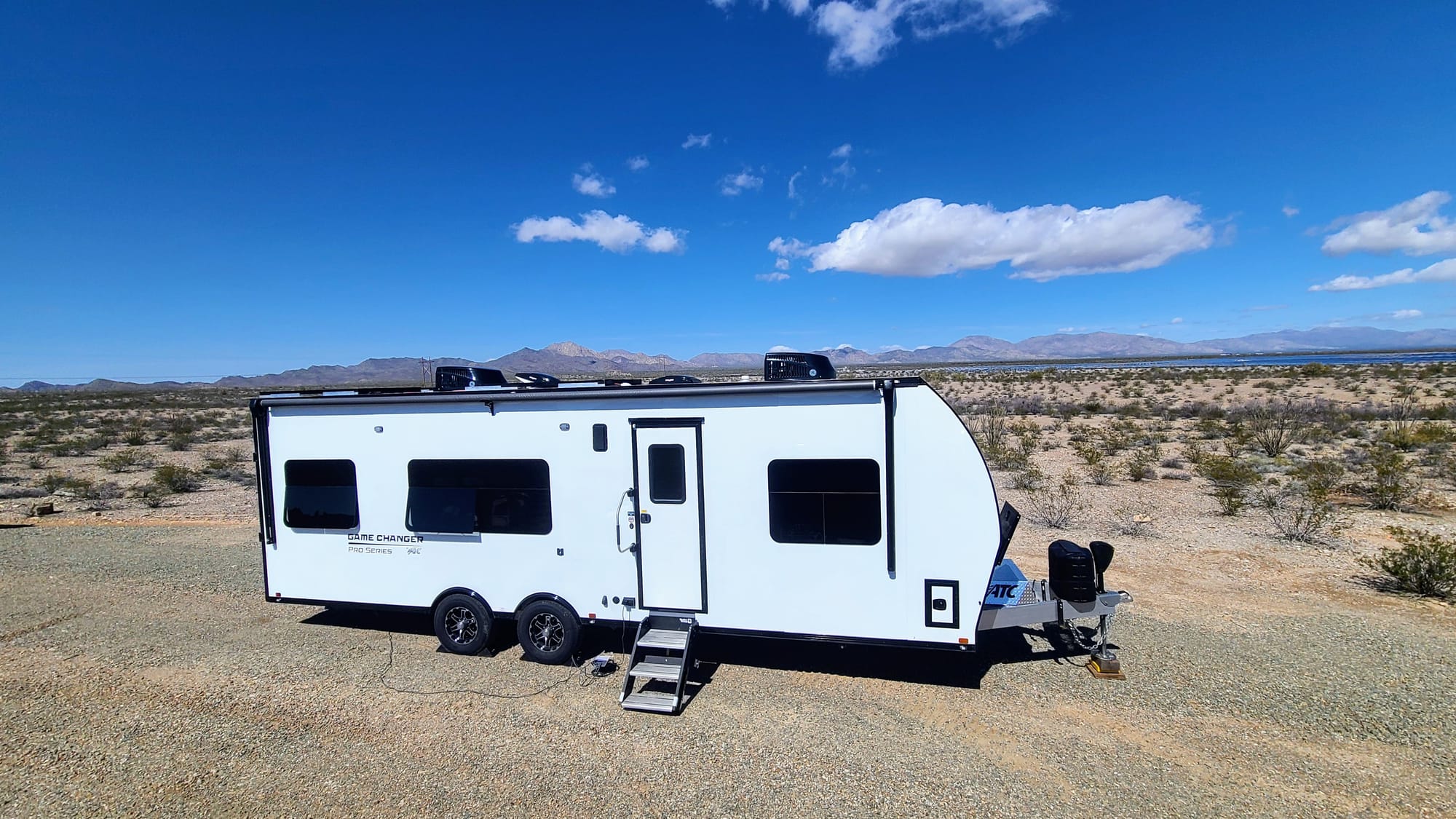
We Got Solar...and then had solar problems...and even more solar problems
And then our batteries had a cascade failure
At the time of writing this post, we have now had our solar install for over 9 months. Despite having some problems with various pieces of the equipment - our panel connectors, inverter, and batteries, to name a few - the installation has completely overhauled how we travel. We gained a lot of freedom and peace of mind, some of which was expected, but other benefits came as a surprise to us.
We conducted a lot of tests on our solar to see how long we could run without purposely conserving our electric. We also spent the summer in unbearable heat, without electric hookups 95% of the time, which really put our panels to the test. Running our air conditioning is, as expected, a major energy suck. However, when we're not dealing with heat waves, we can run off our solar for several days. Sunny days at an unshaded campsite can usually replenish our batteries back to full. On an average day, we can usually replenish about 80% of our power usage for the day. This means we can go a week or more without running our generator, if we needed to. In most cases, we camp at places where generators are allowed, and so we don't worry too much. That said, to be able to choose campsites without needing to worry about hookups has been a real stress relief. Not only has it allowed us to stay in some gorgeous sites, but it's also saved us money.
Monitoring our solar has also given us insights into our wattage draw from different sources. It sounds pretty nerdy, but we enjoy calculating our conservation efforts, whether it's with our electricity, or our water and tank space usage.
We wish we could say that our solar installation has worked seamlessly from the beginning, but that obviously wasn't the case. It's a known fact in the RV world that, the more equipment and fancy schmancy mods you have, the more likely something will go wrong. Our solar setup has a lot of equipment, and sure, sometimes it hasn't performed the way it should. But we 100% couldn't have had this amazing year of travel without it. The benefits most definitely outweigh the costs.
Freedom to choose scenic campsites, saving money, and enjoying conservation efforts were all pretty much given, but as we traveled with this new system in place, we discovered other benefits that weren't initially on our radar.
It's not all-or-nothing.
We planned on finding lots of no hookup sites so we could live completely self-contained, but we also really loved the option of being able to plug into a pedestal with less amperage and still run all the appliances we needed. We stayed at several 30amp sites but never once had to worry about only running one appliance at a time or one air conditioner. In fact, our two longest stays at KOA Williams, AZ and Mountain Meadow near Glacier National Park were both 30amp sites. Oftentimes, 30amp sites cost a little bit less than 50amp, and now with our solar, we can save the money on our site but still live with full use of our electric system.
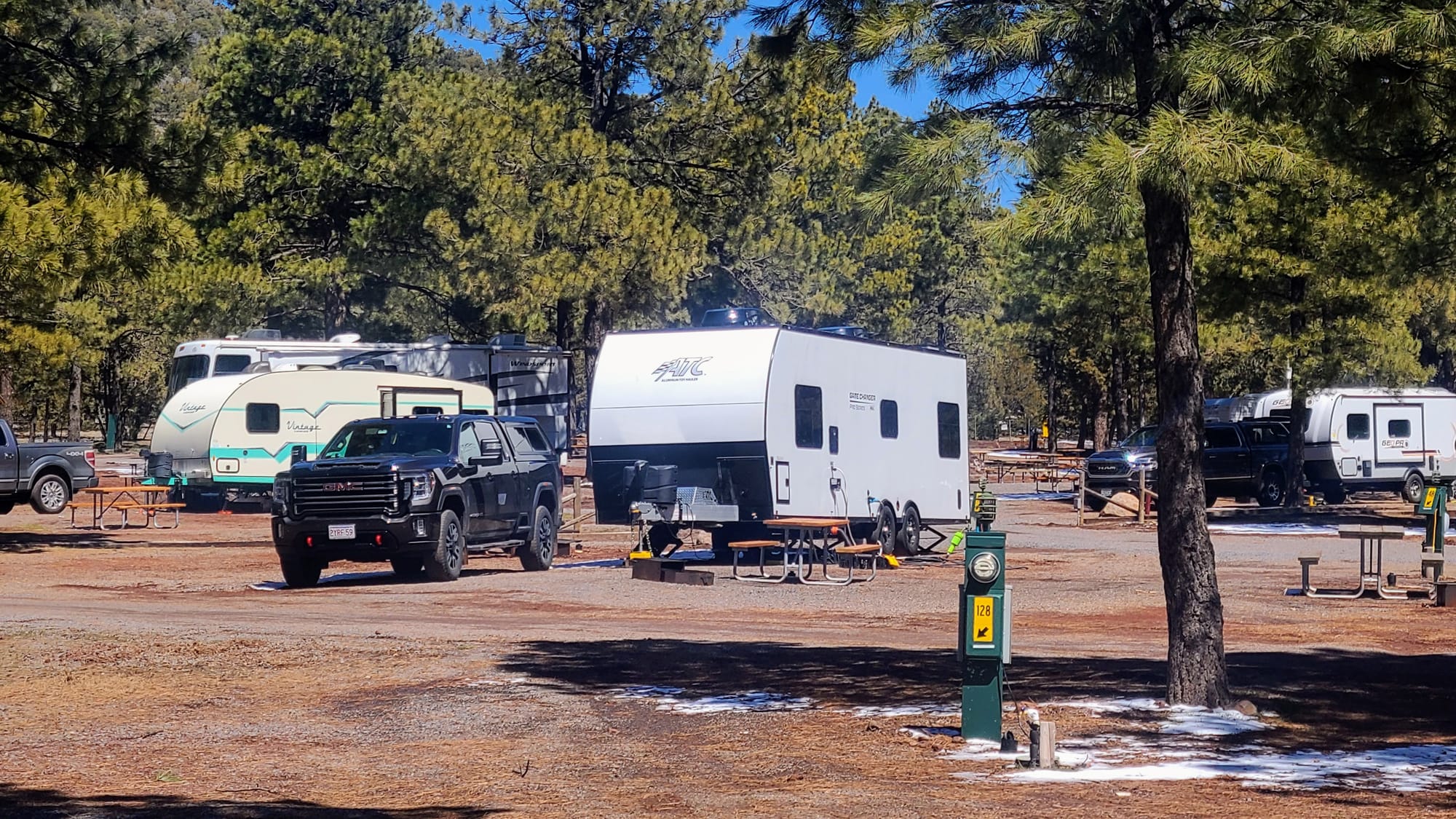
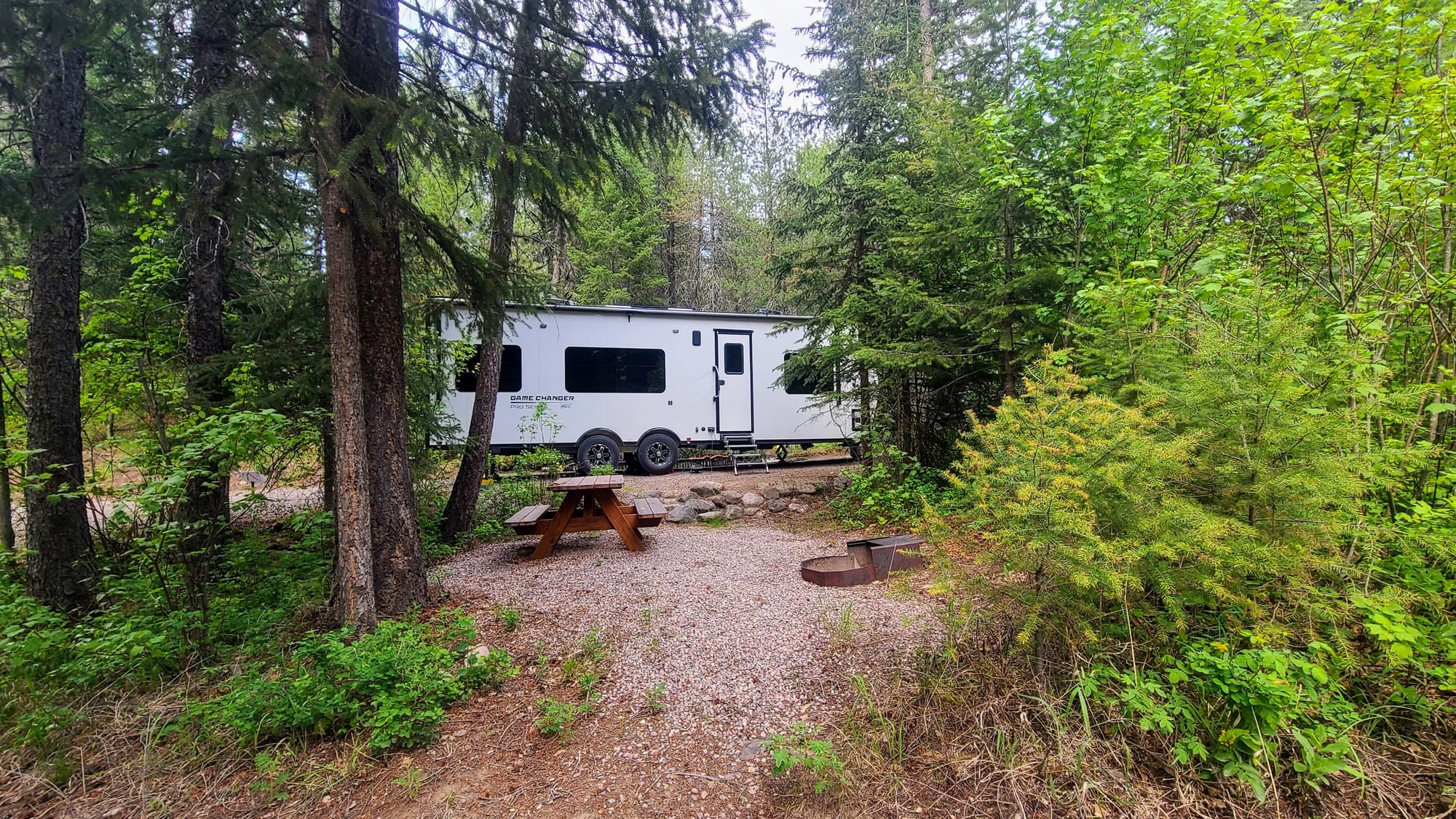
No more power outage worries.
We've had quite a few power outages at our campgrounds since we got solar. On one busy workday when we were at the Williams KOA, Nicole was in the middle of creating a therapeutic music course - something that requires lots of continuous technological connectivity, especially in the production and rendering process. A windstorm knocked out our power, and Nicole was sitting at her desktop completely unaware. Before we had solar, there were a few unfortunate incidents where Nicole would be working on her desktop, the power would go out, and that was it for her studio work for a while.
The real defining moment, though, came when we were staying outside Sedona. We were in the middle of our 4-mile Courthouse Butte hike when Nicole saw an email from our RV resort, Distant Drums, letting us know that they'd be cutting power for about an hour that afternoon. Thank goodness with our solar, we didn't need to worry because we would have a seamless switchover and everything would continue running normally, but think about how dangerous that could get. The desert can heat up extremely quickly, even in the cooler seasons. We had our AC set for the animals while we were out hiking that day. Also, many areas around Sedona don't have good cell signal, and certainly not data connectivity. What if a family had gone hiking that morning and left the AC on for their pets? They might have no clue that the RV park cut power, and because of how thermostats work, many don't keep a cache of the set temperature. That means that the AC would kick off when the power goes out, and even if the power is restored, the AC would stay off, no matter how hot it got in the rig. The owners could be happily hiking away with no plans to return until the end of the day, and they wouldn't even know that their RV was heating to dangerous temperatures for their pets. This of course is why, whether an RV has solar or not, we highly recommend monitoring systems like Govee or Waggle.
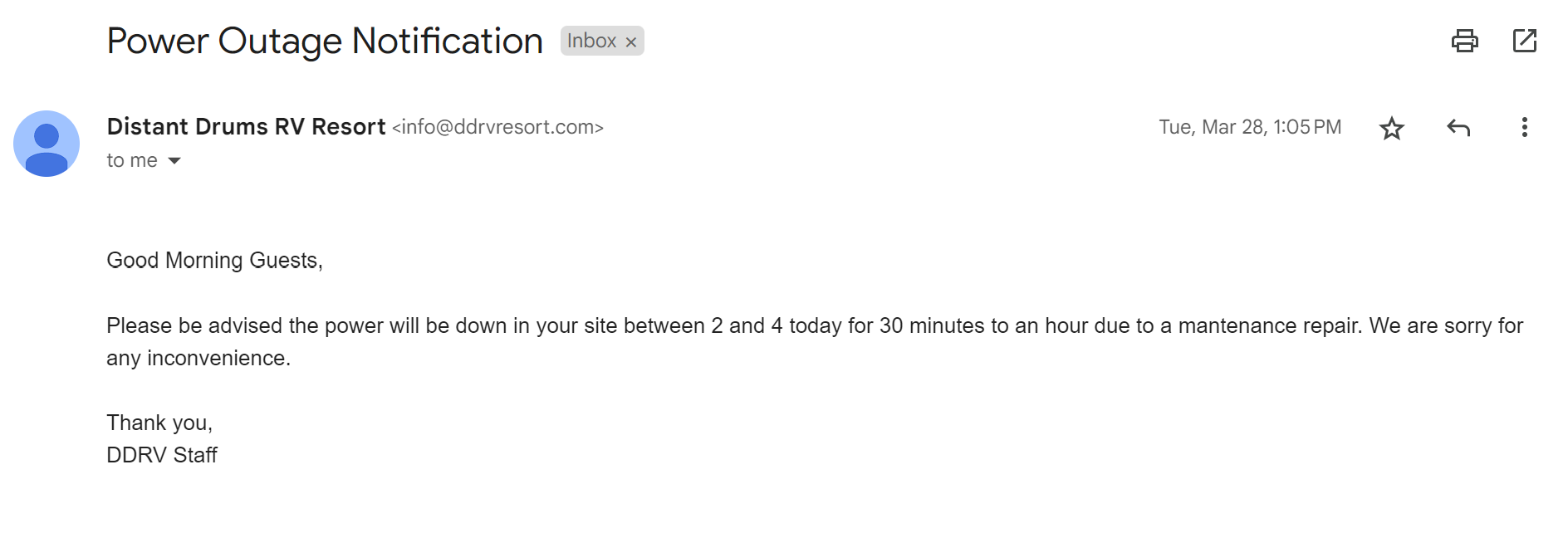
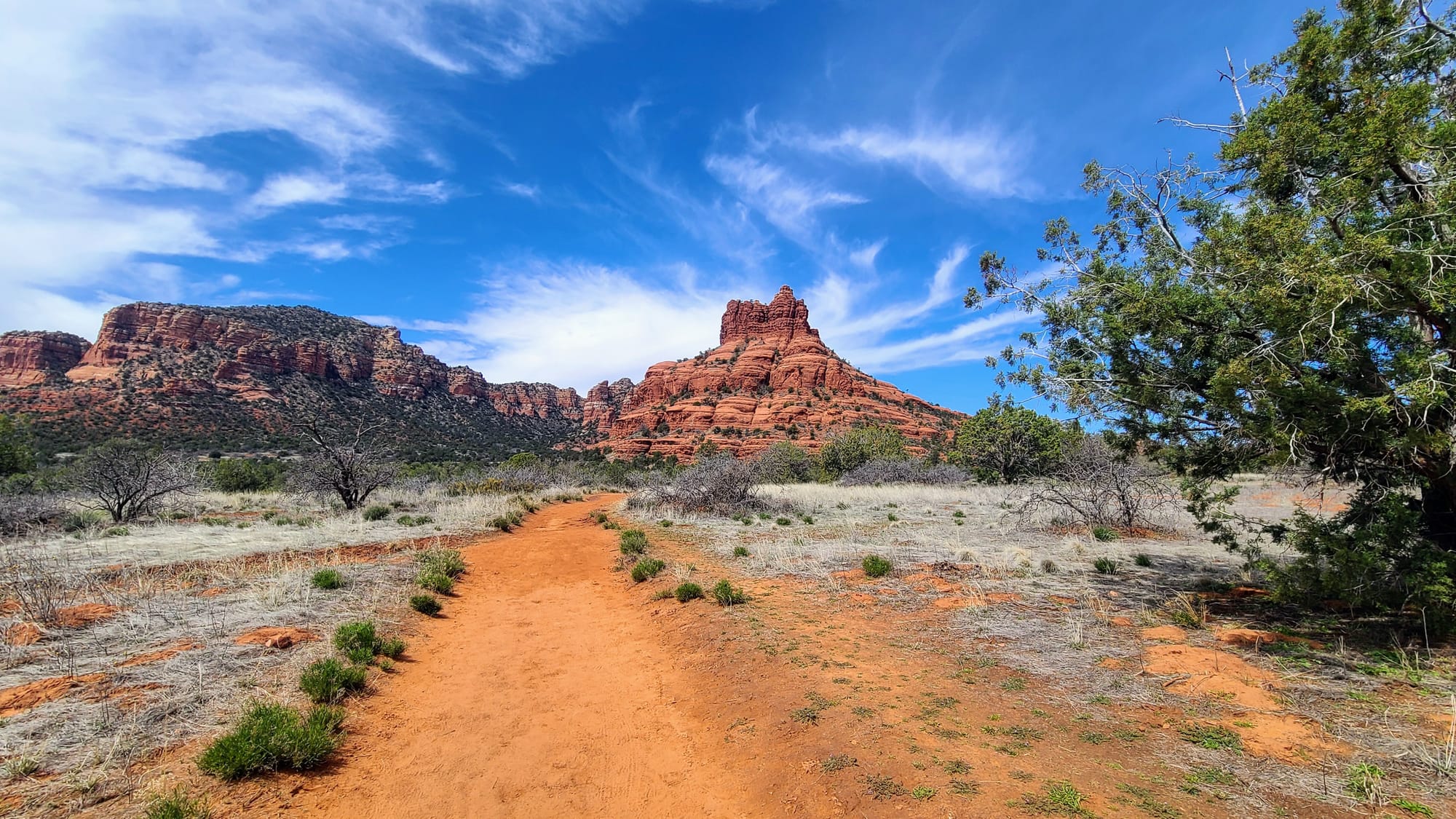
Even though the outage didn't affect us, we left feedback for Distant Drums that, unless this was an utter emergency (in which case CALL your patrons), all scheduled maintenance needs to be communicated ahead of time, so that campers can plan accordingly. An email sent out an hour in advance, when most people were already out exploring for the day, is just not good protocol.
Until this happened, we never truly felt the peace of mind in knowing that, even if a campground's electricity fails, our pets will still be safe and comfortable. What's more is, our solar system has given us an extra way to monitor the pets when we're away. Depending on connectivity, sometimes we can't easily get our cameras or Govee monitor to load. All we need to do now is go into the app that houses our panel information and make sure it's drawing the right amount of electricity that indicates the AC is running.
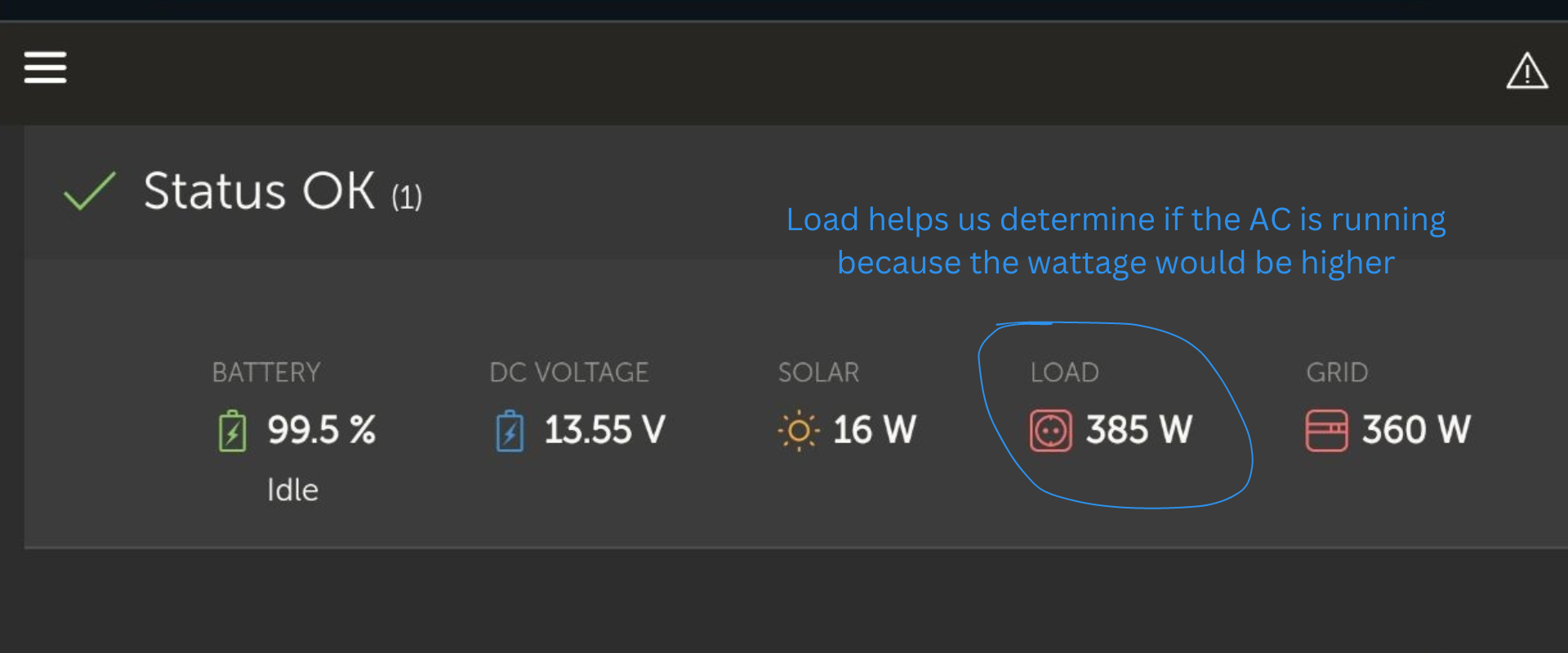
We have a helpful troubleshooting companion.
When a massive cold front came through Williams, AZ, we were able to use our panel to figure out that one of our line heaters had stopped working. Our water lines froze despite having the heaters clicked on. Anthony used the panel to monitor the electric coming in as he tried turning one heater on at a time. By process of elimination, he figured out that a line heater wasn't using any power, but the tank heaters were. We were able to give this information to Complete Trailers when it came time for the line heater repair. We love being able to save the service techs some work by diagnosing problems beforehand. It makes us feel useful and the service techs can use their time more efficiently, getting things fixed that we can't do ourselves.
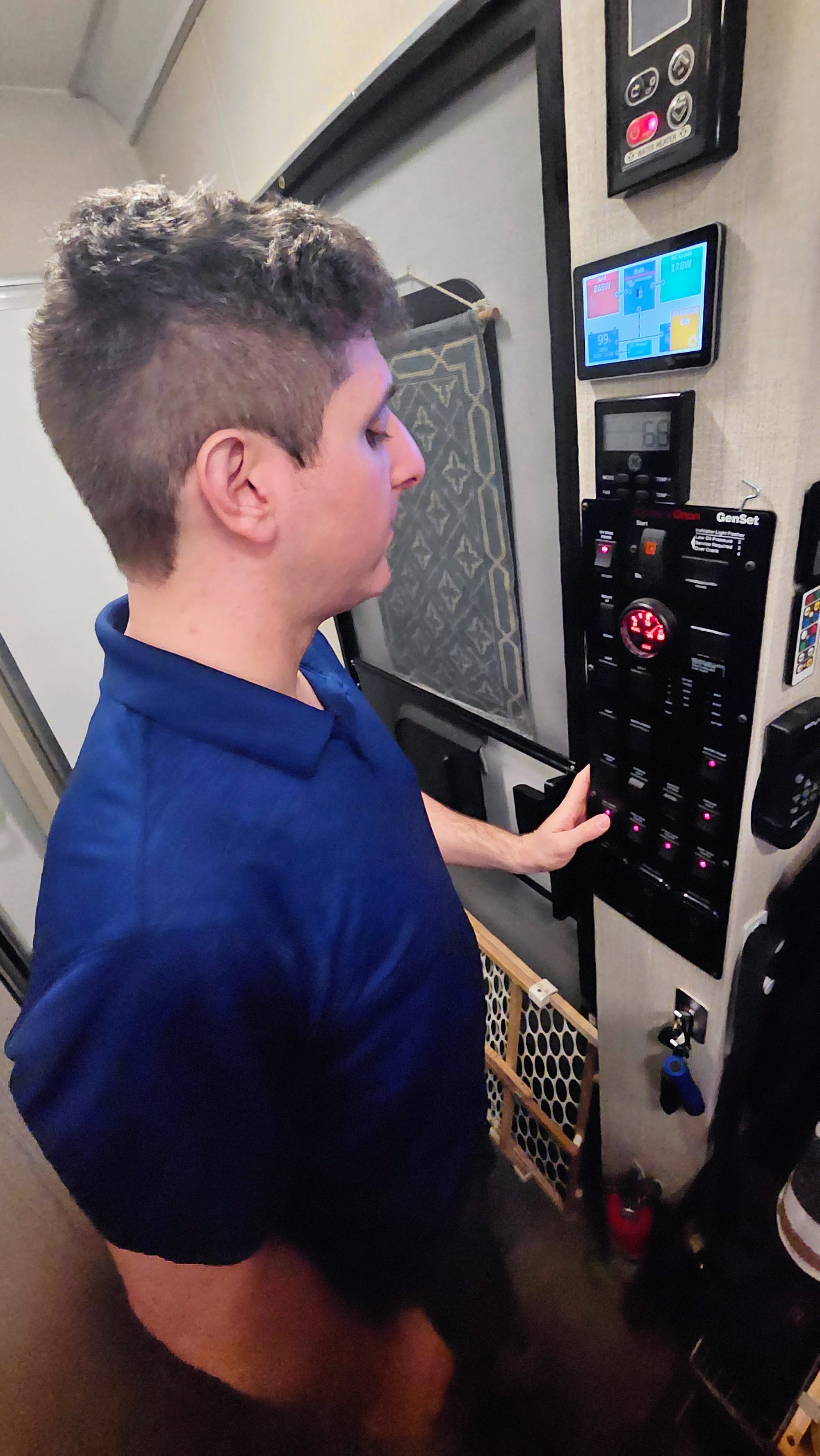
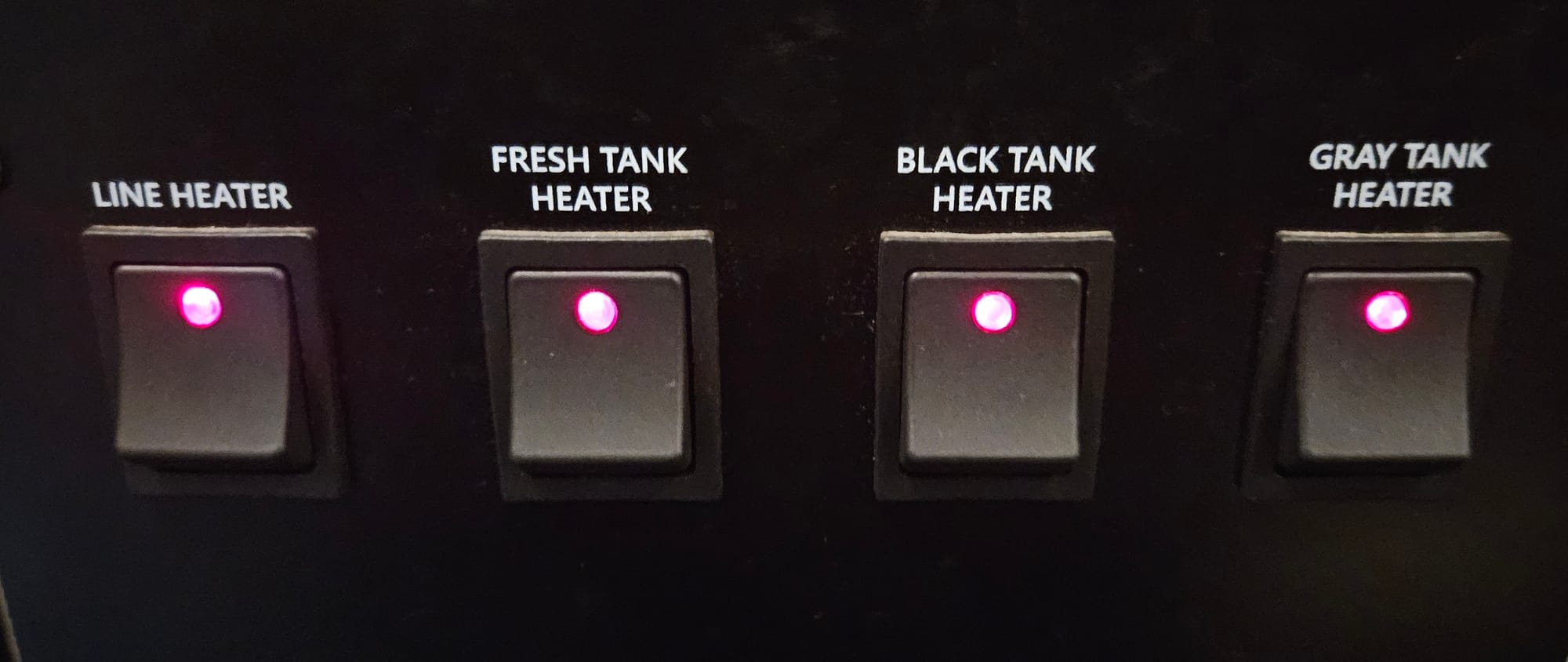
It's the little things.
This was going to be the part of the story where we talk about setting our microwave clock. Before we got solar, we never bothered because whenever we unplugged from a campsite, the clock would go out again. With the seamless switchover of power, our clock stays on all the time. Only, remember how we needed to get a new microwave because our other one broke? Turns out the new microwave's clock doesn't function properly, causing it to run extremely slow and not keep the right time when the microwave is in use. It's disappointing, but since we lived over a year without the microwave clock set, we decided to just not set it and forget it. RecPro, the company we bought the microwave from, did give us a partial refund when we alerted them to the issue. But hey, at least with our solar, our clock now reads 00:00 all the time and never turns off! Yay?
On travel days, when Anthony would be doing his outside tasks and Nicole was inside, there were times when Anthony would unplug the electric, not knowing that Nicole still needed it. We got into the routine of Anthony always asking, "Are you done using the electricity?" Now, there are no worries. We can unplug and put away the power cord and still heat up coffee, tea, or a snack for the road.
Nicole is no longer at the mercy of AC power to do work.
Our first two years on the road, Nicole used a desktop computer for work, particularly when doing big projects for her therapeutic music business. When we boondocked, she had only two choices: 1, plug the desktop into our very inconvenient ceiling outlet that ran off our old inverter (this involved an extension chord and a lot of tripping hazards). Or 2, run the generator the whole time. You know what doesn't mix well with trying to record music and meditations? A loud generator humming in the background!
What's worse than no power, though, was 15amp, like when we were stationed at Nicole's parents' house. The 15amp allowed us to run the desktop but no appliances. That meant that whenever we wanted to use an appliance, we'd need to turn the generator on. Except we didn't have our handy seamless switchover. This meant that Nicole would need to save what she was working on, shut down her computer, and then we'd turn the generator on. Then Nicole either waited until the generator was back off, or she'd turn the computer back on, only to need to shut it down again once we were done with the generator. That's a lot of ons and offs for one computer, and it cannot be healthy. Nicole has since retired her desktop, but for space reasons and not because of electric-related nuisances. Now that we're back to our home-base, we're plugged into 15amp but no longer need to think about turning on our generator. We can run two appliances easily with the combination of the garage outlet and our solar. The garage outlet also keeps our batteries replenished when we don't get enough solar energy on these short winter days, and since we now quadrupled the battery capacity, we can last a while even when not plugged into the outlet.
No more 5AM wake-up calls!
We cannot even count how many mornings we were woken up by the beeping of our low battery charge indicator. This was for 2 reasons, both solved by our solar install. First, despite our skepticism and protests, we were told time and time again that our charge controller was set to correctly monitor lithium batteries. It was not. We always assumed the controller was set to monitor lead acid, as most ATCs come with those stock, but we upgraded to lithium right away. We tried to figure out how to fix it ourselves and tried a few things, but nothing worked. Everyone we asked told us it was set correctly. It wasn't until we were getting our solar installed that Boondoctor John confirmed our suspicions. He oughta know, given how many of those charge controllers he's seen in his career! Turns out, all the workers were looking for the fix in the wrong place, and the charge controller was keeping us from getting a full charge on our batteries. Secondly, in cold weather, when we'd need to run our tank and line heaters in addition to our normal DC appliances, our old converter didn't have the capacity to charge the batteries faster than we were depleting them. This led to a lot of early morning beeping on frigid winter mornings, and the only thing worse than being sleep deprived, is being sleep deprived and cold. Now, we have our new converter that's part of our Victron 3000, and the beeps are a thing of the past!
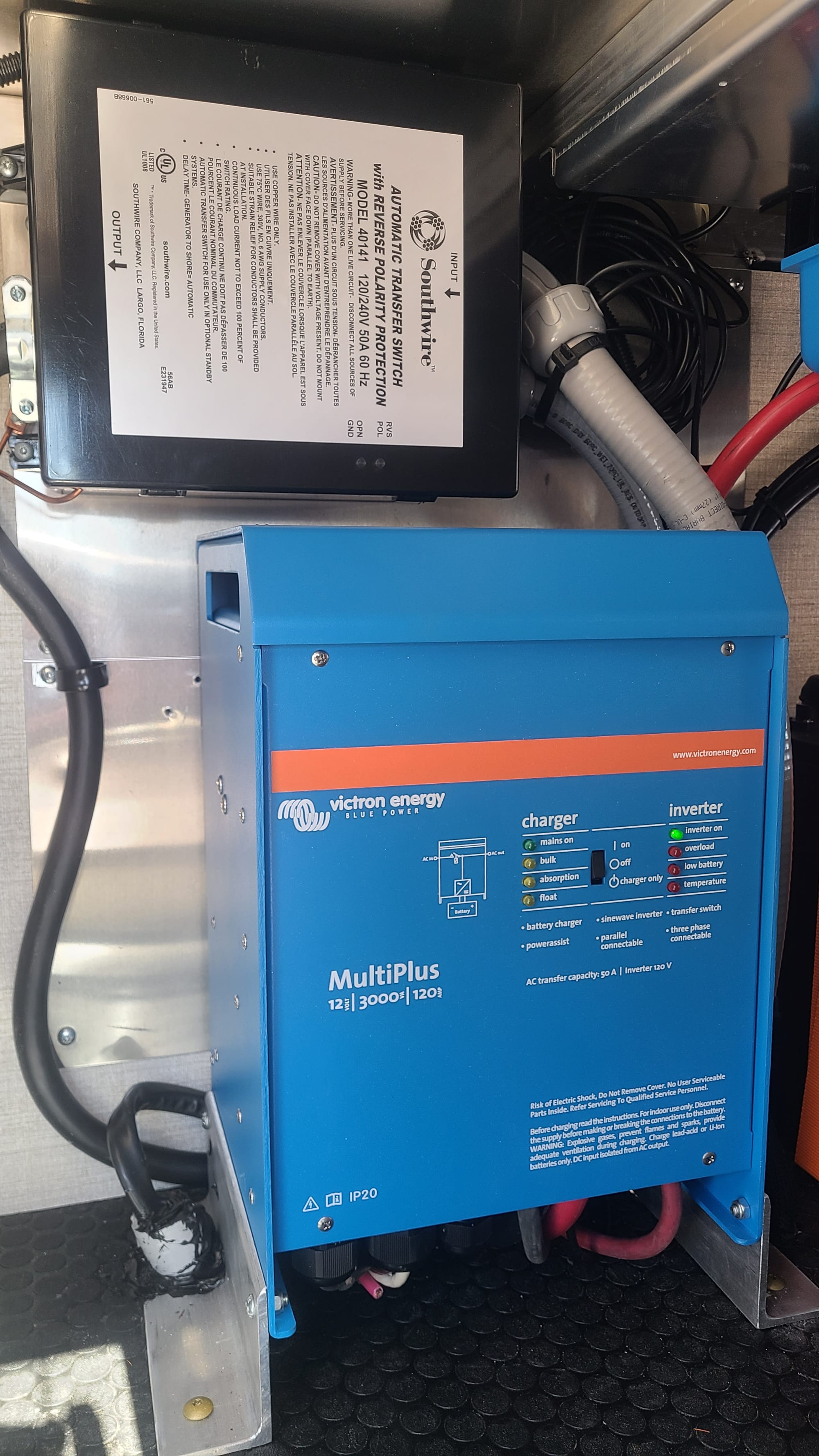
Our 3rd season of travel will be here before we know it, and we're looking forward to setting out on our first full year with solar. Sure, we might have some equipment problems as we go along, but we can't wait to book whatever sites we want, no matter what hookups they offer. We already have some spectacularly scenic sites on the calendar that we can't wait to share.


